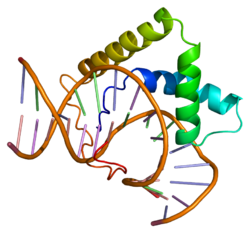TCF7
Appearance
(Redirected from TCF7 (gene))
Transcription factor 7 is the gene that in humans encodes for the TCF1 protein.[5]
References
[edit]- ^ a b c GRCh38: Ensembl release 89: ENSG00000081059 – Ensembl, May 2017
- ^ a b c GRCm38: Ensembl release 89: ENSMUSG00000000782 – Ensembl, May 2017
- ^ "Human PubMed Reference:". National Center for Biotechnology Information, U.S. National Library of Medicine.
- ^ "Mouse PubMed Reference:". National Center for Biotechnology Information, U.S. National Library of Medicine.
- ^ "Entrez Gene: TCF7 transcription factor 7 (T-cell specific, HMG-box)".
Further reading
[edit]- van de Wetering M, Oosterwegel M, Holstege F, et al. (1992). "The human T cell transcription factor-1 gene. Structure, localization, and promoter characterization". J. Biol. Chem. 267 (12): 8530–6. doi:10.1016/S0021-9258(18)42476-3. PMID 1569101.
- van de Wetering M, Oosterwegel M, Dooijes D, Clevers H (1991). "Identification and cloning of TCF-1, a T lymphocyte-specific transcription factor containing a sequence-specific HMG box". EMBO J. 10 (1): 123–32. doi:10.1002/j.1460-2075.1991.tb07928.x. PMC 452620. PMID 1989880.
- Castrop J, van Wichen D, Koomans-Bitter M, et al. (1995). "The human TCF-1 gene encodes a nuclear DNA-binding protein uniquely expressed in normal and neoplastic T-lineage lymphocytes". Blood. 86 (8): 3050–9. doi:10.1182/blood.V86.8.3050.3050. hdl:20.500.11755/05a0e0d7-f80c-4035-a8da-056c8b5b7883. PMID 7579399.
- Mayer K, Wolff E, Clevers H, Ballhausen WG (1995). "The human high mobility group (HMG)-box transcription factor TCF-1: novel isoforms due to alternative splicing and usage of a new exon IXA". Biochim. Biophys. Acta. 1263 (2): 169–72. doi:10.1016/0167-4781(95)00108-s. PMID 7640309.
- Van de Wetering M, Castrop J, Korinek V, Clevers H (1996). "Extensive alternative splicing and dual promoter usage generate Tcf-1 protein isoforms with differential transcription control properties". Mol. Cell. Biol. 16 (3): 745–52. doi:10.1128/mcb.16.3.745. PMC 231054. PMID 8622675.
- Korinek V, Barker N, Willert K, et al. (1998). "Two members of the Tcf family implicated in Wnt/beta-catenin signaling during embryogenesis in the mouse". Mol. Cell. Biol. 18 (3): 1248–56. doi:10.1128/MCB.18.3.1248. PMC 108837. PMID 9488439.
- Roose J, Molenaar M, Peterson J, et al. (1998). "The Xenopus Wnt effector XTcf-3 interacts with Groucho-related transcriptional repressors". Nature. 395 (6702): 608–12. Bibcode:1998Natur.395..608R. doi:10.1038/26989. PMID 9783587. S2CID 4347003.
- Roose J, Huls G, van Beest M, et al. (1999). "Synergy between tumor suppressor APC and the beta-catenin-Tcf4 target Tcf1". Science. 285 (5435): 1923–6. doi:10.1126/science.285.5435.1923. PMID 10489374.
- Brantjes H, Roose J, van De Wetering M, Clevers H (2001). "All Tcf HMG box transcription factors interact with Groucho-related co-repressors". Nucleic Acids Res. 29 (7): 1410–9. doi:10.1093/nar/29.7.1410. PMC 31284. PMID 11266540.
- Batlle E, Henderson JT, Beghtel H, et al. (2002). "Beta-catenin and TCF mediate cell positioning in the intestinal epithelium by controlling the expression of EphB/ephrinB". Cell. 111 (2): 251–63. doi:10.1016/S0092-8674(02)01015-2. PMID 12408869. S2CID 10103038.
- Noble JA, White AM, Lazzeroni LC, et al. (2003). "A polymorphism in the TCF7 gene, C883A, is associated with type 1 diabetes". Diabetes. 52 (6): 1579–82. doi:10.2337/diabetes.52.6.1579. PMID 12765974.
- Ioannidis V, Kunz B, Tanamachi DM, et al. (2003). "Initiation and limitation of Ly-49A NK cell receptor acquisition by T cell factor-1". J. Immunol. 171 (2): 769–75. doi:10.4049/jimmunol.171.2.769. PMID 12847244.
- Smit L, Baas A, Kuipers J, et al. (2004). "Wnt activates the Tak1/Nemo-like kinase pathway". J. Biol. Chem. 279 (17): 17232–40. doi:10.1074/jbc.M307801200. PMID 14960582.
- Smith SS, Patterson T, Pauza ME (2005). "Transgenic Ly-49A inhibits antigen-driven T cell activation and delays diabetes". J. Immunol. 174 (7): 3897–905. doi:10.4049/jimmunol.174.7.3897. PMID 15778344.
- Willinger T, Freeman T, Herbert M, et al. (2006). "Human naive CD8 T cells down-regulate expression of the WNT pathway transcription factors lymphoid enhancer binding factor 1 and transcription factor 7 (T cell factor-1) following antigen encounter in vitro and in vivo". J. Immunol. 176 (3): 1439–46. doi:10.4049/jimmunol.176.3.1439. hdl:20.500.11820/b4e3a221-e38b-4f3a-9dbe-1641533de25a. PMID 16424171.








